Top 10 Biggest Must-watch SS Rajamouli Films.
SS Rajamouli is one of the most acclaimed directors in the Indian film industry. Known for his grand vision and larger-than-life storytelling, Rajamouli has created some of the biggest blockbusters in Indian cinema. From epic historical dramas to high-octane action thrillers, his films have captured the imagination of audiences worldwide.
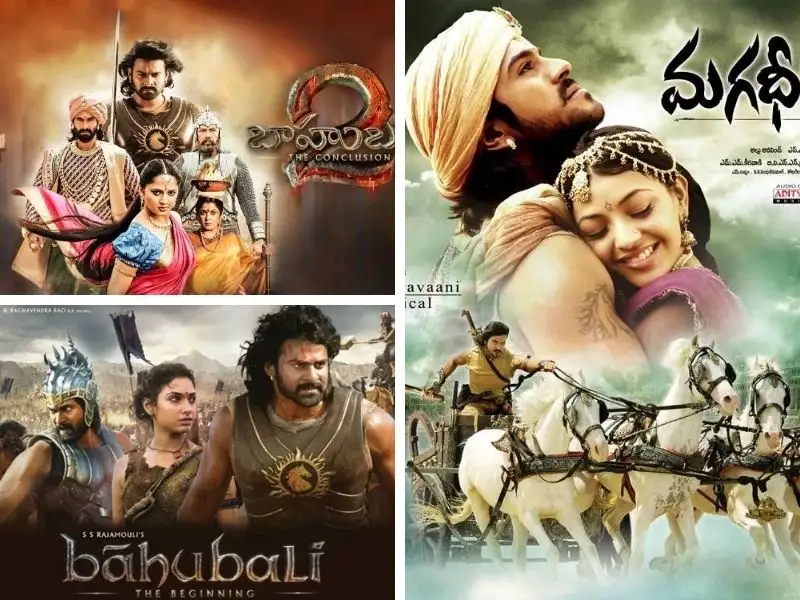
Rajamouli’s journey in the film industry began with his debut film, “Student No. 1,” released in 2001. The film, a coming-of-age drama set in a college backdrop, showcased Rajamouli’s knack for storytelling and his ability to create compelling characters. It was a commercial success and marked the beginning of a successful career for the director.
Following the success of his debut film, Rajamouli went on to direct a series of films that established him as a force to be reckoned with in the industry. One such film is “Magadheera,” released in 2009. This epic fantasy drama took the audience on a mesmerizing journey through time, blending elements of romance, action, and adventure. The film’s groundbreaking visual effects and gripping narrative made it a massive hit at the box office.
Rajamouli’s next venture, “Eega” (2012), showcased his versatility as a director. This unique film, which tells the story of a man who is reincarnated as a fly to seek revenge, was a game-changer in Indian cinema. With its innovative storytelling and impressive visual effects, “Eega” received critical acclaim and was a commercial success.
In 2015, Rajamouli released his magnum opus, “Baahubali: The Beginning.” This epic historical drama took the Indian film industry by storm and became a cultural phenomenon. The film’s grand scale, breathtaking visuals, and compelling storyline captivated audiences around the world. It went on to become one of the highest-grossing Indian films of all time.
The success of “Baahubali: The Beginning” was followed by its sequel, “Baahubali: The Conclusion,” in 2017. This film concluded the epic saga and surpassed the success of its predecessor. With its gripping narrative, larger-than-life action sequences, and stunning visual effects, “Baahubali: The Conclusion” became a global sensation and solidified Rajamouli’s position as one of the most visionary directors in the industry.
Rajamouli’s filmography also includes other notable films such as “Simhadri” (2003), “Yamadonga” (2007), and “Maryada Ramanna” (2010). Each of these films showcases Rajamouli’s ability to create engaging stories and his expertise in handling diverse genres.
Check out the List of Must-watch films of SS Rajamouli.
Baahubali: The Beginning (2015)
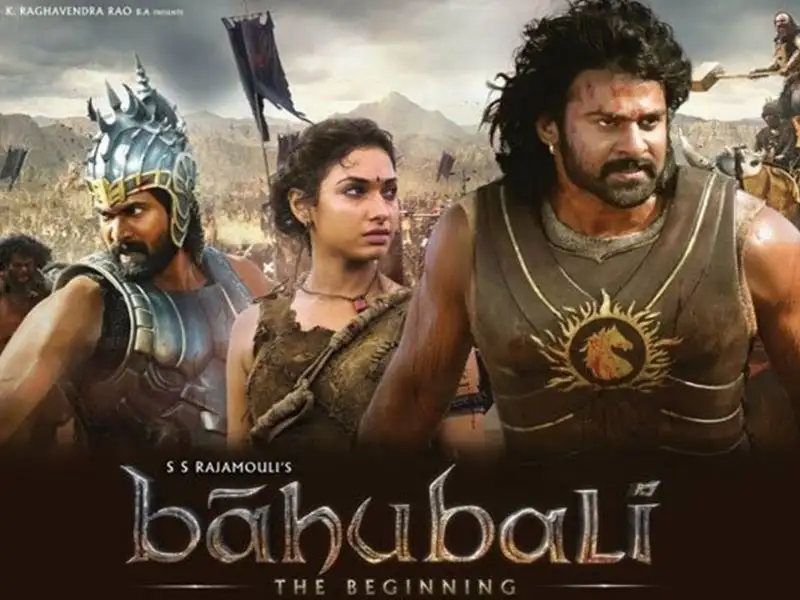
Baahubali: The Beginning is the film that catapulted SS Rajamouli to international fame. This epic historical drama tells the story of two brothers, Baahubali and Bhallaladeva, who are vying for the throne of the fictional kingdom of Mahishmati. With its breathtaking visuals, larger-than-life action sequences, and captivating storyline, Baahubali: The Beginning is a cinematic masterpiece that should not be missed.
The film takes the audience on a mesmerizing journey through the mythical world of Mahishmati, a kingdom filled with majestic palaces, lush landscapes, and towering waterfalls. The attention to detail in the production design is truly awe-inspiring, with every frame of the film showcasing the grandeur and opulence of this fictional realm. One of the film’s standout features is its larger-than-life action sequences. From gravity-defying stunts to intense battle scenes, Baahubali: The Beginning pushes the boundaries of what is possible in Indian cinema. The choreography of the fight sequences is meticulously crafted, with every move executed with precision and grace. The visual effects further enhance the impact of these scenes, seamlessly blending real-life action with computer-generated imagery. But it is not just the technical aspects that make Baahubali: The Beginning a masterpiece.
At its core, the film is a tale of love, betrayal, and redemption. The complex relationship between the two brothers, Baahubali and Bhallaladeva, forms the heart of the narrative. Their contrasting personalities and conflicting ambitions create a compelling dynamic that keeps the audience engaged from start to finish. The performances in Baahubali: The Beginning are nothing short of extraordinary. Prabhas delivers a career-defining performance as Baahubali, exuding strength, charisma, and vulnerability in equal measure. Rana Daggubati is equally impressive as the menacing Bhallaladeva, infusing the character with a palpable sense of menace and ruthlessness. The supporting cast, including Anushka Shetty, Tamannaah Bhatia, and Ramya Krishnan, also deliver standout performances, adding depth and nuance to their respective roles. In addition to its visual and narrative brilliance, Baahubali: The Beginning also serves as a testament to the power of Indian cinema on the global stage. The film’s success not only broke box office records but also garnered critical acclaim from audiences and critics alike.
It opened doors for Indian filmmakers to explore new genres and push the boundaries of storytelling, paving the way for more ambitious and visually stunning films in the future. In conclusion, Baahubali: The Beginning is a cinematic masterpiece that deserves all the praise and accolades it has received. From its breathtaking visuals to its captivating storyline, the film is a testament to the talent and vision of director SS Rajamouli. Whether you are a fan of epic historical dramas or simply appreciate the art of filmmaking, Baahubali: The Beginning is a must-watch that will leave you in awe.
Baahubali 2: The Conclusion (2017)
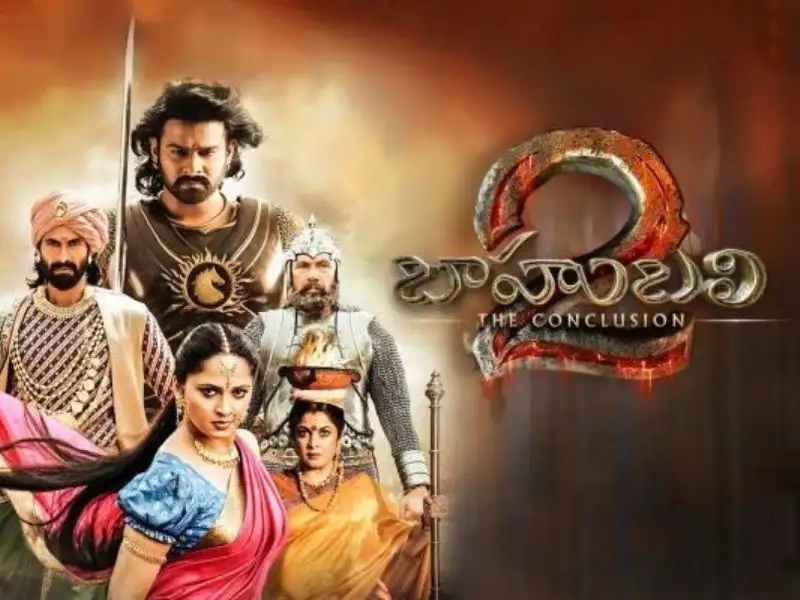
“Baahubali 2: The Conclusion” is a 2017 Indian epic action film directed by S.S. Rajamouli. It is the sequel to the 2015 film “Baahubali: The Beginning” and concludes the two-part saga. The film follows the story of Amarendra Baahubali and his son Mahendra Baahubali as they fight against tyranny and injustice in the fictional kingdom of Mahishmati. Filled with breathtaking visuals, elaborate action sequences, and intricate storytelling, “Baahubali 2: The Conclusion” became a massive commercial success and garnered widespread acclaim for its grandeur and cinematic excellence.
Magadheera (2009)
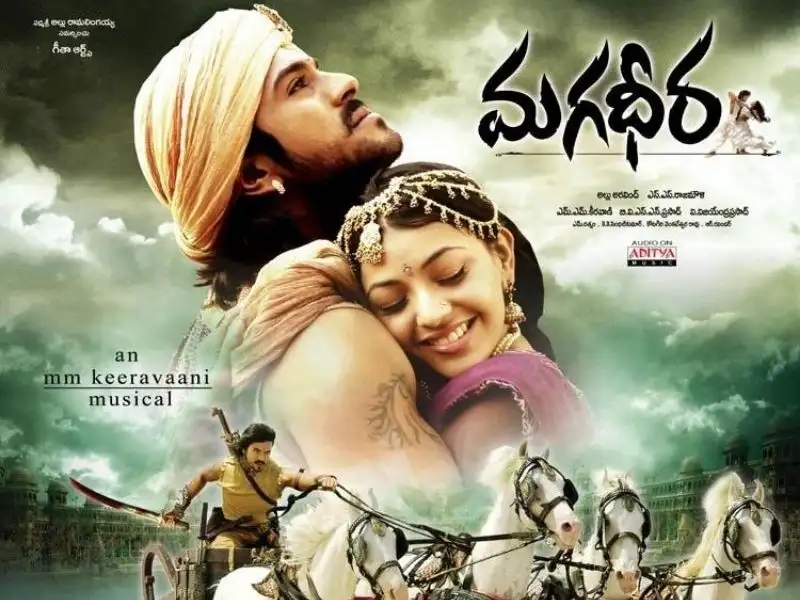
Magadheera is a romantic action film that showcases Rajamouli’s mastery in blending different genres. The movie follows the story of Harsha, a bike stuntman who discovers that he is the reincarnation of a warrior named Kala Bhairava from the past. As Harsha delves deeper into his past life, he uncovers a tale of love, betrayal, and revenge that spans centuries.
The film opens with a breathtaking sequence set in the 17th century, where Kala Bhairava, a brave warrior, fights against an evil king and his army. The battle scenes are beautifully choreographed, with stunning visual effects that transport the audience back in time. The attention to detail in recreating the historical setting is commendable, from the costumes to the architecture of the palaces.
Fast forward to the present day, Harsha is a daredevil bike stuntman who performs death-defying stunts for a living. His life takes an unexpected turn when he meets Indu, a young woman who bears an uncanny resemblance to a princess from Kala Bhairava’s era. As Harsha and Indu spend more time together, they start experiencing flashbacks and visions from their past lives.
Rajamouli masterfully weaves together the past and the present, seamlessly transitioning between the two timelines. The romance between Harsha and Indu blossoms amidst the chaos of their shared past, creating a sense of urgency and danger in their relationship. The chemistry between the lead actors is palpable, and their performances add depth and emotion to the story.
Magadheera is not just a love story; it is also an action-packed extravaganza. The film is filled with adrenaline-pumping fight sequences, horse chases, and epic battles that will leave you in awe. The visual effects are top-notch, with seamless integration of CGI and practical effects. The attention to detail in the action sequences is remarkable, with every move and every blow choreographed to perfection.
What sets Magadheera apart from other films in its genre is its emotional depth. The film explores themes of love, loyalty, and sacrifice, and delves into the complexities of human relationships. The characters are well-developed, with each having their own motivations and struggles. The audience becomes emotionally invested in their journey, rooting for their triumphs and mourning their losses.
Overall, Magadheera is a cinematic masterpiece that showcases Rajamouli’s storytelling prowess. With its gripping storyline, superb performances, and mind-blowing action sequences, the film is a rollercoaster ride that will keep you on the edge of your seat. Whether you are a fan of romance, action, or historical dramas, Magadheera has something for everyone.
Eega (Makkhi)
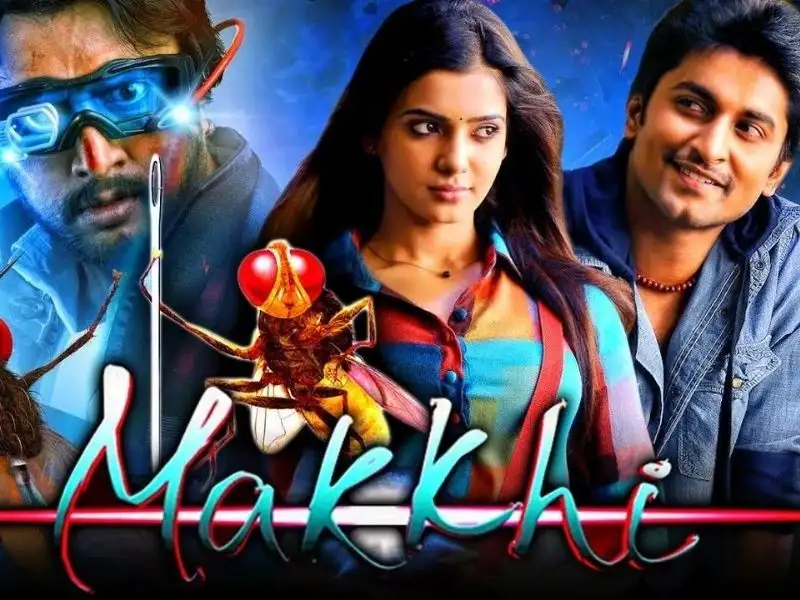
Eega, also known as Makkhi, is a unique and imaginative film that pushes the boundaries of storytelling. The movie revolves around a man named Nani, who is reincarnated as a housefly after being brutally murdered by a powerful businessman named Sudeep. As a fly, Nani’s primary objective becomes seeking revenge on his killer and protecting his love interest, Bindu.
What sets Eega apart from other revenge dramas is its innovative concept and execution. Director S.S. Rajamouli takes the audience on a thrilling journey by presenting the entire narrative from the perspective of a tiny insect. This perspective allows the audience to experience the world through the fly’s eyes, creating a sense of vulnerability and tension throughout the film.
The visual effects in Eega are nothing short of extraordinary. The filmmakers have seamlessly blended live-action footage with computer-generated imagery to bring the fly to life. Every movement and interaction of the fly with its surroundings are meticulously crafted, making it easy for the audience to suspend their disbelief and become fully immersed in the story.
However, Eega is not just a visual spectacle. The film also boasts a compelling and engaging narrative. The screenplay, penned by Rajamouli himself, is filled with twists and turns that keep the audience on the edge of their seats. The characters are well-developed, and their motivations are clearly defined, making it easy for the audience to connect with them emotionally.
Moreover, Eega explores themes of love, revenge, and the power of determination. Nani’s transformation into a fly symbolizes his unwavering resolve to seek justice and protect those he cares about. The film also delves into the consequences of unchecked power and the lengths one is willing to go to achieve their goals.
Eega received widespread critical acclaim upon its release. It won several awards for its visual effects and innovative storytelling. The performances of the cast, including Nani, Samantha Ruth Prabhu, and Sudeep, were also highly praised for their convincing portrayals.
In conclusion, Eega is a must-watch for anyone looking for something out of the ordinary. Its unique concept, impressive visual effects, and engaging narrative make it a standout film in the world of Indian cinema. Whether you’re a fan of revenge dramas or simply appreciate innovative storytelling, Eega is sure to captivate and entertain you from start to finish.
Sye (2004)
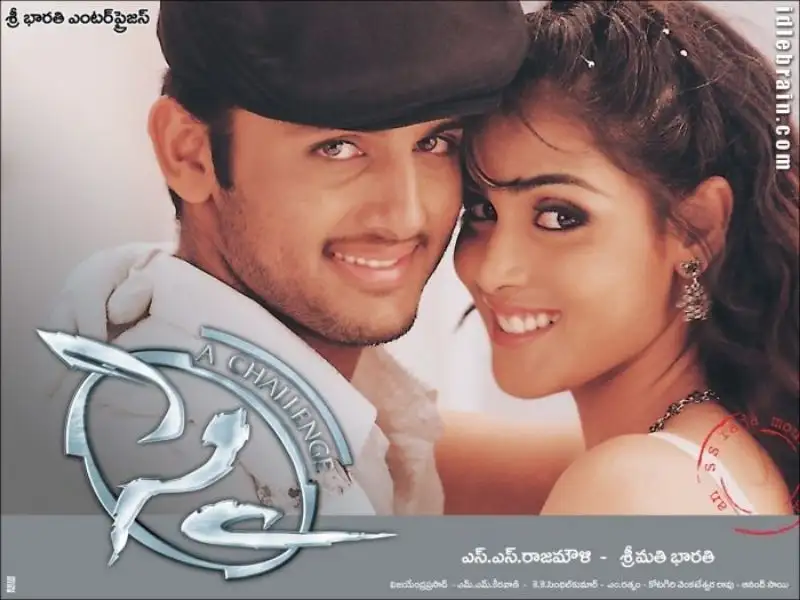
Sye is a sports drama film that showcases Rajamouli’s versatility as a director. Set against the backdrop of college rugby, the movie follows the journey of a group of students who come together to win a prestigious tournament. With its intense sports sequences, memorable characters, and heartfelt emotions, Sye is a film that will leave you cheering for the underdogs.
The film Sye, released in 2004, marked a significant milestone in Rajamouli’s career. Known for his ability to tell engaging stories across various genres, Rajamouli proved his versatility once again with this sports drama. The movie captivated audiences with its compelling narrative and powerful performances. The story of Sye revolves around a group of college students who form a rugby team with the goal of winning a prestigious tournament. The film beautifully captures the journey of these underdogs as they face numerous challenges, both on and off the field. Through their determination, teamwork, and unwavering spirit, the students overcome obstacles and strive to achieve their dreams. One of the standout aspects of Sye is its intense sports sequences. Rajamouli, known for his meticulous attention to detail, masterfully choreographed the rugby matches, creating an immersive experience for the viewers. The adrenaline-pumping action on the field keeps the audience on the edge of their seats, making them feel like they are part of the game. In addition to the thrilling sports sequences, Sye also shines in its portrayal of memorable characters. Each member of the rugby team has a unique personality and backstory, making them relatable and endearing to the audience.
As the film progresses, we witness their growth, both as individuals and as a team, which adds depth and emotional resonance to the story. Furthermore, Sye touches upon various themes that resonate with the audience. It explores the power of unity, the importance of perseverance, and the value of friendship. The film beautifully showcases how a group of individuals, despite their differences, can come together and achieve greatness when they work towards a common goal. Sye is not just a sports film; it is a heartfelt tale that tugs at the heartstrings.
The emotional moments in the movie are expertly crafted, evoking a range of feelings from joy to sadness. The audience becomes emotionally invested in the characters’ journeys, rooting for their success and feeling their pain. In conclusion, Sye is a remarkable film that showcases Rajamouli’s talent as a director. With its intense sports sequences, memorable characters, and heartfelt emotions, the movie leaves a lasting impact on the audience. Whether you are a sports enthusiast or simply appreciate a well-crafted story, Sye is a must-watch film that will leave you inspired and cheering for the underdogs.
The Legacy of Vikramarkudu
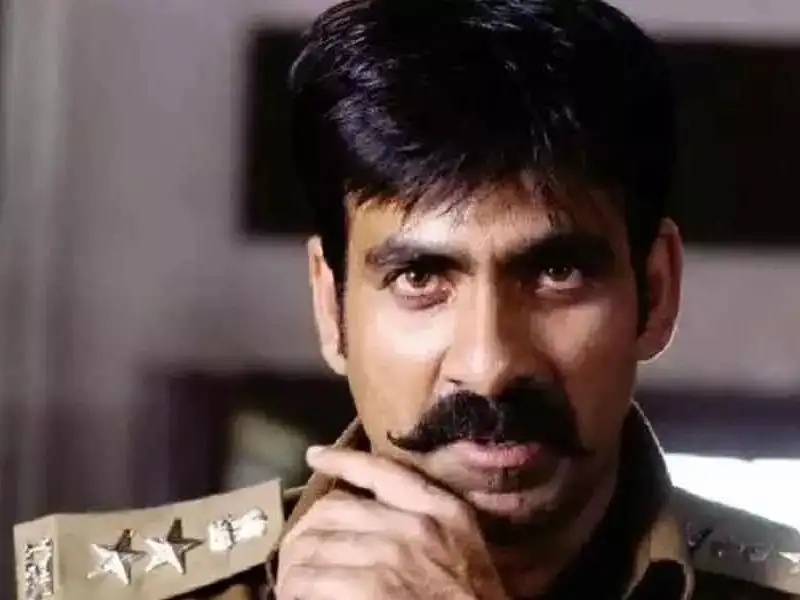
Vikramarkudu, released in 2006, not only established Rajamouli as a master storyteller but also left a lasting impact on the Indian film industry. The movie’s success paved the way for numerous remakes and inspired filmmakers to explore similar themes of identity, action, and suspense. Its influence can be seen in both regional cinema and Bollywood, where it sparked a trend of larger-than-life action films.
One of the key aspects that makes Vikramarkudu stand out is Rajamouli’s meticulous attention to detail. From the intricately choreographed action sequences to the well-crafted dialogues, every element of the film adds to its overall impact. The movie’s fast-paced narrative keeps the audience on the edge of their seats, as they become invested in the protagonist’s journey.
Rajamouli’s choice of casting also contributed to Vikramarkudu’s success. The film features Ravi Teja in a dual role, showcasing his versatility as an actor. Ravi Teja effortlessly transitions between the characters of a thief and a police officer, bringing depth and authenticity to both roles. His charismatic performance adds an extra layer of entertainment to the already gripping storyline.
Another noteworthy aspect of Vikramarkudu is its technical brilliance. The film’s cinematography, done by Shyam K. Naidu, captures the action sequences with precision and flair. The use of innovative camera angles and dynamic editing techniques heightens the impact of the film’s thrilling moments. The background score by M.M. Keeravani adds to the overall intensity, enhancing the viewing experience.
Vikramarkudu’s success not only lies in its entertainment value but also in its ability to resonate with the audience on a deeper level. The film explores themes of justice, morality, and the power of the individual. It raises questions about the blurred lines between good and evil, and the lengths one would go to protect their loved ones. These thought-provoking elements elevate Vikramarkudu from being just another action film to a memorable cinematic experience.
Overall, Vikramarkudu is a testament to Rajamouli’s storytelling prowess and his ability to create films that captivate and engage the audience. It remains a milestone in Indian cinema and continues to be celebrated for its thrilling narrative, strong performances, and technical brilliance. Whether you’re a fan of action-packed thrillers or simply appreciate well-crafted cinema, Vikramarkudu is a must-watch.
Maryada Ramanna (2010)
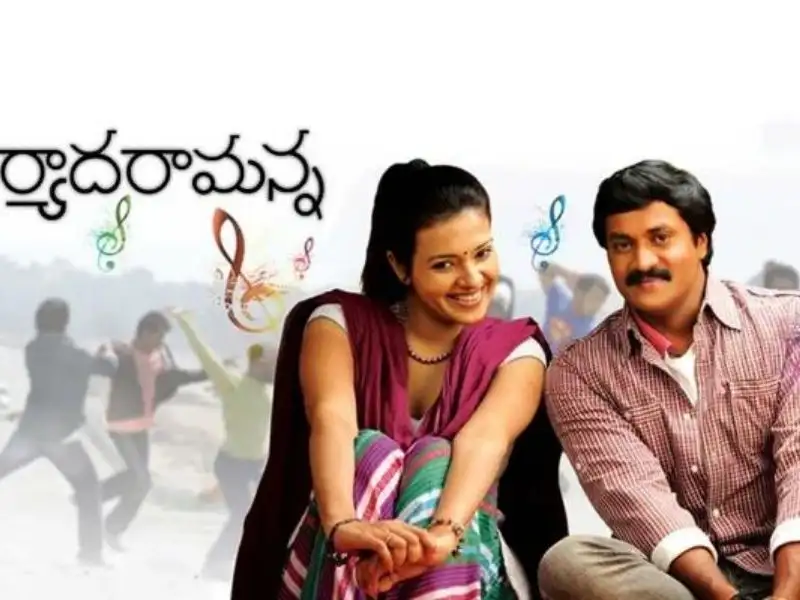
Maryada Ramanna is a comedy-drama film that showcases Rajamouli’s ability to entertain audiences with his lighthearted storytelling. The movie revolves around a man named Ramu, played by Sunil, who seeks refuge in a village after a series of unfortunate events. Ramu, an innocent and kind-hearted man, finds himself caught up in a hilarious series of events that test his wit and resilience.
The village is ruled by two feuding families, the Ramulamma family and the Nageswara Rao family. Ramu, unaware of the village’s history, inadvertently becomes a part of the ongoing conflict when he accidentally saves the life of the head of the Nageswara Rao family, a man named Balaraju. As a gesture of gratitude, Balaraju promises to protect Ramu from any harm that may come his way.
With the promise of safety, Ramu begins to settle into the village, forming bonds with the villagers and even falling in love with Aparna, the daughter of the Ramulamma family. However, as the truth about Ramu’s identity starts to unravel, tensions rise, and the village becomes a battleground for the two families. Ramu, now torn between his love for Aparna and his loyalty to Balaraju, must find a way to bring peace to the village and unite the warring families.
Maryada Ramanna is filled with witty humor, endearing characters, and heartwarming moments that leave the audience in splits and touched. Rajamouli’s direction brings out the best in the actors, with Sunil delivering a stellar performance as the innocent and lovable Ramu. The film also features a talented ensemble cast, including Saloni Aswani, Nagineedu, and Brahmaji, who bring their characters to life with their impeccable comic timing.
The movie’s screenplay, written by Rajamouli and Rama Rajamouli, is a testament to their storytelling prowess. The narrative is well-paced, keeping the audience engaged from start to finish. The dialogues are sharp and witty, adding an extra layer of humor to the already hilarious situations. The music, composed by M. M. Keeravani, complements the film perfectly, enhancing the emotional impact of the story.
Overall, Maryada Ramanna is a delightful watch for those looking for a feel-good film that combines comedy, drama, and romance. Rajamouli’s ability to create a captivating story with relatable characters is evident in this film, making it a memorable addition to his repertoire.
Yamadonga (2007)
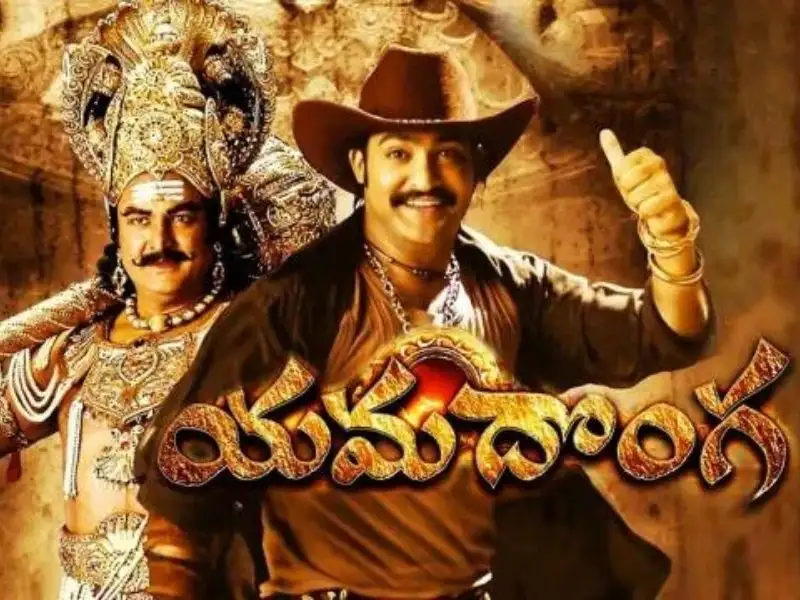
Yamadonga is a fantasy action-comedy film that showcases Rajamouli’s creativity and visual flair. The movie follows the story of a thief named Raja, played by Jr. NTR, who is sent to hell after his death. However, Raja is not one to give up easily. He strikes a deal with the god of death, Yamadharma Raja, portrayed by Mohan Babu, to be sent back to earth and continue living. The catch is that he must change his ways and lead a righteous life.
As Raja returns to earth, he finds himself in the midst of a corrupt and unjust society. He takes it upon himself to bring about a change and fight against the powerful and influential individuals who exploit the common people. With his wit, charm, and extraordinary abilities, Raja becomes a symbol of hope for the oppressed and downtrodden.
The film is a visual treat, with stunningly choreographed action sequences and larger-than-life sets. Rajamouli’s attention to detail and his ability to create a fantastical world that blends seamlessly with reality is evident throughout the movie. The colorful visuals and extravagant costumes add to the overall appeal of the film, making it a visual extravaganza.
Yamadonga is not just about the action and fantasy elements, though. It also has its fair share of comedy and romance. The interactions between Raja and the god of death provide some hilarious moments, while the love story between Raja and Mahi, played by Priyamani, adds a touch of romance to the narrative.
What sets Yamadonga apart from other films in the genre is its strong social message. Through Raja’s journey, the film highlights the importance of standing up against injustice and fighting for what is right. It serves as a reminder that even the smallest individual has the power to bring about a significant change in society.
Jr. NTR delivers a stellar performance as Raja, effortlessly transitioning between the comedic and action-packed scenes. Mohan Babu’s portrayal of Yamadharma Raja adds depth to the character and brings a certain gravitas to the film. The supporting cast, including actors like Ali, Brahmanandam, and Venu Madhav, also shine in their respective roles, adding to the overall entertainment value of the movie.
In conclusion, Yamadonga is a delightful mix of fantasy, action, comedy, and romance. With its imaginative storyline, colorful visuals, and entertaining performances, the film takes the audience on a fun-filled ride that will leave them with a smile on their face and a renewed sense of hope.
Simhadri (2003)
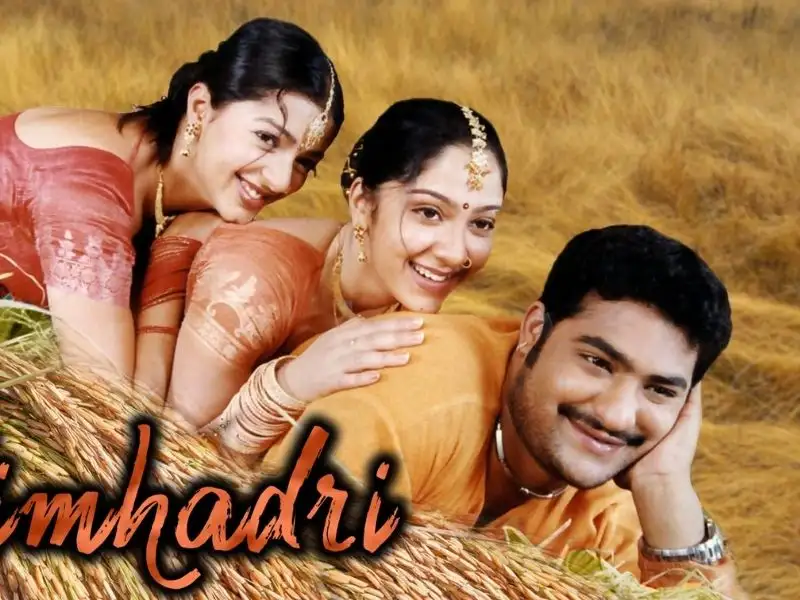
Simhadri is an action-packed film that showcases Rajamouli’s ability to create larger-than-life characters. The movie follows the story of a loyal servant named Simhadri, played by Jr. NTR, who takes on a powerful criminal to protect his master’s family. Simhadri, known for his unwavering loyalty and unmatched strength, becomes the ultimate savior for the family, facing numerous challenges and obstacles along the way.
The film begins with Simhadri, a humble and dedicated servant, working for the wealthy Narasimha (played by Nassar) and his family. Simhadri’s devotion to his master knows no bounds, and he would go to any lengths to protect them. However, things take a dramatic turn when Narasimha’s daughter, Indu (played by Bhoomika Chawla), falls in love with a young man named Vamsi (played by Ankhitha). Narasimha strongly opposes their relationship, leading to a conflict between him and Vamsi.
Simhadri, witnessing the love between Indu and Vamsi, decides to intervene and help them unite. But little does he know that this act of kindness will unleash a series of events that will test his strength, courage, and loyalty. The powerful criminal Bhai Saab (played by Rahul Dev) enters the picture, becoming the main antagonist of the film. Bhai Saab is feared by everyone in the town, and his reign of terror knows no bounds.
Simhadri, with his unmatched physical prowess and unwavering determination, takes it upon himself to protect his master’s family from the clutches of Bhai Saab. The film takes the audience on a rollercoaster ride of action, drama, and emotions as Simhadri faces off against Bhai Saab and his henchmen. The intense action sequences, choreographed to perfection, keep the viewers on the edge of their seats, eagerly awaiting the outcome of the battle.
Simhadri’s character is not just about physical strength; he is also portrayed as a man with a golden heart. His love and devotion for his master’s family are evident throughout the film, and his selflessness becomes an inspiration for the audience. The powerful dialogues delivered by Jr. NTR, combined with his impeccable acting skills, add depth and intensity to the character.
Simhadri is not just an action-packed film; it also explores themes of love, loyalty, and sacrifice. The bond between Simhadri and his master’s family is portrayed beautifully, showcasing the importance of relationships and the lengths one would go to protect their loved ones. The film also highlights the power of good over evil, as Simhadri’s determination and courage ultimately triumph over the darkness.
Overall, Simhadri is a captivating film that keeps the audience hooked from start to finish. Rajamouli’s exceptional storytelling combined with Jr. NTR’s powerful performance makes this film a must-watch for action lovers. With its larger-than-life characters, intense action sequences, and a gripping storyline, Simhadri is a true testament to Rajamouli’s directorial skills and his ability to create unforgettable cinematic experiences.
Student No.1 (2001)
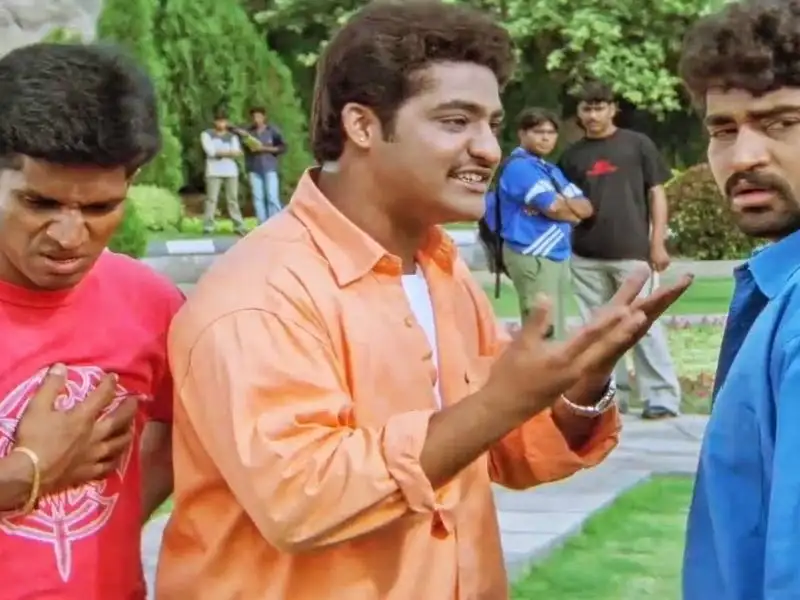
Student No.1 is Rajamouli’s debut film and a testament to his talent as a director. The movie follows the story of a young man named Aditya, played by Jr. NTR, who joins a prestigious college with a hidden agenda – to avenge his father’s death. Aditya’s father, a respected professor at the college, was falsely accused of a crime and died under mysterious circumstances. Determined to uncover the truth and bring justice to his family, Aditya embarks on a journey that not only tests his physical abilities but also challenges his beliefs and values.
What sets Student No.1 apart from other revenge dramas is Rajamouli’s unique storytelling style and his ability to seamlessly blend various genres. The film combines elements of action, romance, comedy, and drama, creating a captivating narrative that keeps the audience hooked from start to finish. Rajamouli’s attention to detail is evident in every frame, as he meticulously crafts each scene to enhance the emotional impact of the story.
One of the film’s highlights is its youthful energy, which is reflected in the vibrant college campus and the dynamic performances by the cast. Jr. NTR delivers a power-packed performance as Aditya, capturing both the vulnerability and determination of his character. His electrifying dance moves and intense action sequences further elevate the film’s entertainment quotient.
Another aspect that makes Student No.1 memorable is its catchy music. Composed by M. M. Keeravani, the film’s soundtrack is a blend of foot-tapping numbers and soulful melodies. Songs like “Ee Chota Nuvvunna” and “Kukkurukuru Kick” became instant hits and are still popular among fans of Telugu cinema.
Moreover, the film’s engaging storyline keeps the audience on the edge of their seats. As Aditya delves deeper into the dark secrets of the college, he encounters a web of deceit, betrayal, and unexpected alliances. The plot twists and turns, keeping the viewers guessing until the very end. Rajamouli’s ability to maintain suspense and build tension is commendable, making Student No.1 a thrilling cinematic experience.
Student No.1 not only established Rajamouli as a promising director but also set the stage for his future successes. The film’s commercial success and critical acclaim paved the way for Rajamouli to explore different genres and push the boundaries of Telugu cinema. It served as a stepping stone for his subsequent blockbusters like Magadheera, Eega, and the Baahubali series, cementing his position as one of India’s most visionary filmmakers.




